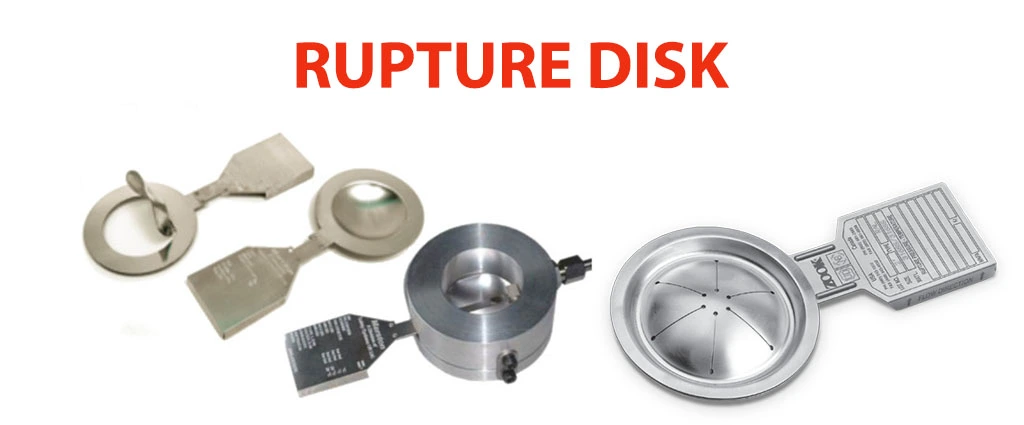A rupture disk also known as a pressure safety disc, burst disc, bursting disc, or burst diaphragm is a pressure relief device that is designed to burst at a predetermined pressure and temperature. It is typically made of a thin metal disk that is clamped in a holder. When the pressure in the system exceeds the burst pressure of the disk, the disk ruptures and releases the pressure.
Rupture disks are commonly used in series (upstream) with a Relief valve to prevent corrosive fluids from contacting the metal parts of the valve. In addition, this combination is a reclosing system.

Purposes of Rupture Disks
Rupture disks are used for a variety of purposes, including:
- Primary relief: Rupture disks can be used as the primary relief device in a system, providing protection against overpressure.
- Secondary relief: Rupture disks can also be used as a secondary relief device, providing backup protection in case the primary relief device fails.
- Series with relief valve: Rupture disks can be installed in series with a relief valve to protect the valve from corrosive fluids and to act as a seal.
- Quick opening valve: Rupture disks can also be used as quick opening valves due to their fast response time.
Types of Rupture Disks
There are two main types of rupture disks: forward-acting and reverse-acting.
- Forward-acting rupture disks: The pressure is applied to the concave side of the disk, causing it to bulge and eventually rupture.
- Reverse-acting rupture disks: The pressure is applied to the convex side of the disk, causing it to buckle and eventually rupture.
Applications of Rupture Disks
Rupture disks are used in a wide variety of applications, including:
- Petrochemical industry
- Aerospace industry
- Aviation industry
- Defense industry
- Medical industry
- Railroad industry
- Nuclear industry
- Chemical industry
- Pharmaceutical industry
- Food processing industry
- Oil field industry
Advantages of Rupture Disks
Rupture disks have a number of advantages over other types of pressure relief devices, including:
- Leak-tightness
- Instantaneous response time
- Minimum pressure drop
- Low cost
- Very high reliability
- Minimum maintenance
Disadvantages of Rupture Disks
Rupture disks also have a few disadvantages, including:
- They must be replaced after each rupture occurrence.
- They allow venting until system pressure equals downstream pressure.
Conclusion
Rupture disks are a versatile and reliable type of pressure relief device that can be used in a wide variety of applications.
Read Also
Download Free Piping PDF for Interview Preparation
Know more about Heat Exchanger
Download Free Piping PDF for Interview Preparation
What is gasket and their types
What is a valve and its types?
1 thought on “What is a Rupture Disk?”